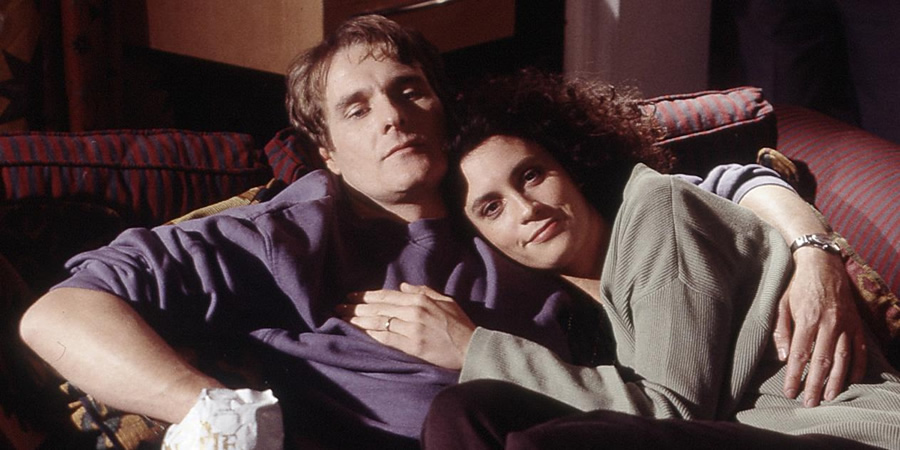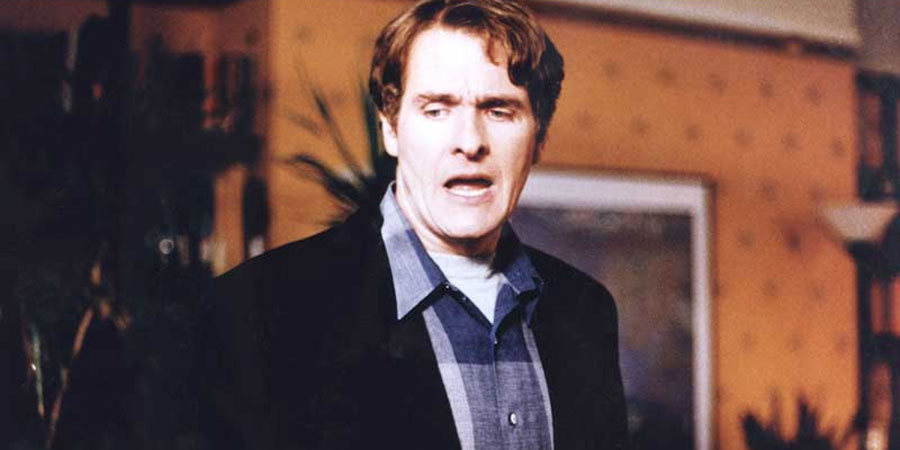
A romance reversed in Joking Apart

These days Steven Moffat is perhaps better known as one of the brains behind dramas including Sherlock, Dracula and of course Doctor Who. But he was making his mark in television decades before these recent hits, applying the same wizardry with plotting and intricate storylines to the studio sitcom.
Moffat found huge success with his first screenwriting credit, Press Gang, a comedy drama aimed at young people but with enough clever jokes that it was enjoyed by a wide-ranging audience. Running for five series, the show catapulted the likes of Julia Sawalha and Dexter Fletcher to stardom. After two series, Moffat began to mull over ideas for his next project. Stalwart sitcom director Bob Spiers put him in touch with producer Andre Ptaszynski who, after hearing his initial pitch for a school sitcom, realised Moffat was much more passionate when talking about his impending divorce and suggested he write about that instead. This led to the commission of a pilot script, filmed in 1990, for what would become Joking Apart.
Taking the old adage of 'write what you know' to the extreme, central character Mark (Robert Bathurst) played up the minutiae of Moffat's personality and tics: a screenwriter whose wife, Becky (Fiona Gillies), leaves him for estate agent Trevor (Paul Mark Elliott). In real life Moffat's wife was herself the estate agent, but he added the character of Trevor specifically so that he could be as derisory as he liked.
Paramount in differentiating Joking Apart from its contemporaries was the comedy's structure. Moffat refers to the premise of the show as "a romantic comedy backwards", using a non-linear framework to tell the story, juxtaposing central characters Mark and Becky meeting with their life post-divorce. Added into the mix are Becky's best friends Robert and Tracy (Paul Raffield and Tracie Bennett), who experience their own trials and tribulations through the series, and are often drawn into the central couple's drama - their efforts usually more hindrance than help.
The stall is set out right from the first scene, as Mark utters the immortal words "My wife left me...". Each episode began with this phrase, another example of Moffat going against the traditional norms by dashing any hope the audience might have had that these two will get back together. Joking Apart ceases to be a will they/won't they, instead morphing into an arguably more interesting examination of the effects of divorce.
The plotting often made heavy use of both foreshadowing and irony, with a glib comment in happier scenes paying off in a more tragic context later. Every episode is an intricately constructed farce, with the basic format of ten minutes of set-up, ten minutes of escalation and the final ten minutes of resultant ridiculousness and insanity. In many ways it mirrors David Renwick's style in One Foot In The Grave, in that no matter how unbelievable the denouement, the plotting was always in place to support it.

Providing a DVD commentary many years later, Moffat described his writing process in detail, deeming it so difficult that at one point he resorted to "lying upside down to see if the plot would drain into my head". Tracie Bennett has also talked about the enormous pressure of filming such intense and precisely written scripts, calling a scene from the final episode - where she has to play two separate characters having a phone conversation - as the most difficult thing she's done in her entire career.
Bathurst already had comedy credentials, having appeared in the likes of Blackadder, The Lenny Henry Show, Chelmsford 123 and even the first episode of Red Dwarf, while for Fiona Gillies Joking Apart was her first major television role. Bennett and Paul Raffield meanwhile were better known for theatre, with Bennett subsequently winning several Olivier awards. Rounding out the cast was Paul Mark Elliott, who made a name for himself in the alternative comedy boom of the early eighties, appearing alongside Steve Frost and Mark Arden (The Oblivion Boys) and actor Lee Cornes in an act called The Wow Show.
What differentiated Joking Apart from other sitcoms of the era was Moffat's refusal to spoon feed the audience or deign to delight them with a happy ending. Our sympathies sway between Mark and Becky throughout the series, with both character's flaws brought to the fore. In Mark's case it is his unassailable need to speak almost entirely in one liners and quips while for Becky it is her refusal to maintain a monogamous relationship. The overarching ethos of Joking Apart is perhaps best summed up by Becky's line in the first episode that she "didn't sign on to be your lawfully wedded straight man". Moffat frequently used actual dialogue from his own life in the series, admitting in one interview "I didn't realise I was that bad... until I wrote about it!".
While America's Seinfeld is famed for pioneering the use of stand-up comedy as a plot device, Joking Apart actually got there first. Each episode featured Mark in a comedy club telling jokes relating to that week's plot, but even Moffat himself has conceded that, in hindsight, this was a bad idea. The persistent problem is that the scenes were found to confuse the audience. Filmed with gel over the camera lens, to add a hazy effect, it was never clear whether these scenes were supposed to be a personification of Mark's mindset or actual footage of Mark relating his experiences on-stage. The production team had intended to refilm them once the rest of the series had been completed, but excessive costs kiboshed the idea.
Although a third series was discussed, Moffat ultimately felt that the show had outrun its premise. He and the cast remained firm friends, and he explained in a recent interview with BCG that he would like to reunite the team - whether for a reunion episode using the aforementioned idea of filming new stand-up sequences - or another project entirely. The sitcom having been released on DVD and found a new audience, Moffat remains as keen as ever to turn it into a stage show.
The story of those eventual DVD releases is almost as dramatic as the plots themselves. Craig Robins, an ardent and audacious fan, wasn't content with waiting to see if the BBC would ever get round to releasing his favourite sitcom. Instead of writing letters, he went one further: he wrote a cheque. A big one. Thirty thousand pounds to be precise, which secured him the rights to the series. As a professional videotape editor, he already had much of the skill, and as it proved, the tenacity too: every shot in every episode was painstakingly restored and remastered to a quality that many felt surpassed the BBC's own DVD releases.
Not only did the episodes now look as crisp as when they were first broadcast, Robins was determined that this would be no bare bones cash in. In an interview, he explained: "Although I know other people have done it, I could not in all conscience release something with only the episodes on it, even though I know the fans would kill just for that. I'm thinking, 'I'm a fan, I want to give the fans what I would like to have."
The end result is two DVD sets crammed with content, documentaries and original scripts. The real joy of the DVDs though are the commentaries, in which Moffat, Bathurst, Gillies, Bennett and in Series 2, Raffield, wax lyrical about the show. The genuine friendship and warmth between them lights up each episode and every possible insight into the show is covered, from script issues and production mistakes to Moffat's favourite episode.
Moffat's original school sitcom pitch eventually arrived in the form of Chalk in 1997, followed by his most successful comedy series to date, Coupling, in 2004. However, nothing has come close to the fervour inspired by Joking Apart. Moffat and Bathurst frequently speak fondly of the show, with the latter stating in several interviews that it was the most fun job of his career. Joking Apart stands as a true testament to one of Britain's greatest screenwriters working at full flight with a cast at the very top of their game.
Where to start?

Series 2, Episode 1
As Joking Apart is a sitcom that relies heavily on knowledge set up in the first episode, it would be wise to start there. However, the Series 2 opener is arguably the best coalition of intricate plotting and punchlines. After months of legal wrangling, Mark discovers Becky's new address and goes to have a talk. When he gets trapped inside, what he discovers might just give him a renewed hope for his relationship with Becky...
This episode also won the prestigious Bronze Rose of Montreux in 1995.
Help us publish more great content by becoming a BCG Supporter. You'll be backing our mission to champion, celebrate and promote British comedy in all its forms: past, present and future.
We understand times are tough, but if you believe in the power of laughter we'd be honoured to have you join us. Advertising doesn't cover our costs, so every single donation matters and is put to good use. Thank you.
Love comedy? Find out moreJoking Apart - The Complete First Series

Thanks to new DVD label Replay, we finally get to see the first series of Joking Apart, the award-winning sitcom written by Steven Moffat. It stars Robert Bathurst as a comedy writer whose life rapidly descends into riotous farce when his wife leaves him.
First released: Monday 29th May 2006
- Distributor: Replay
- Region: 2
- Discs: 1
- Minutes: 179
- Subtitles: English
- Catalogue: RP5443
![]() Buy and sell old and new items
Buy and sell old and new items
Search for this product on eBay
BCG may earn commission on sales generated through the links above.
Joking Apart - The Complete Second Series

Second series of the cult comedy series Joking Apart, released through the independent Replay distributors, and available from their own shop.
First released: Monday 17th March 2008
- Distributor: Replay
- Region: 2
- Discs: 2
- Minutes: 167
- Subtitles: English
![]() Buy and sell old and new items
Buy and sell old and new items
Search for this product on eBay
BCG may earn commission on sales generated through the links above.

